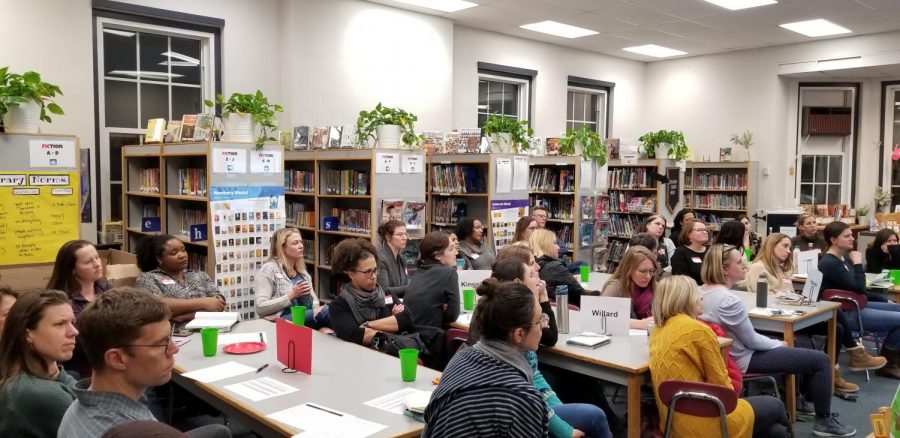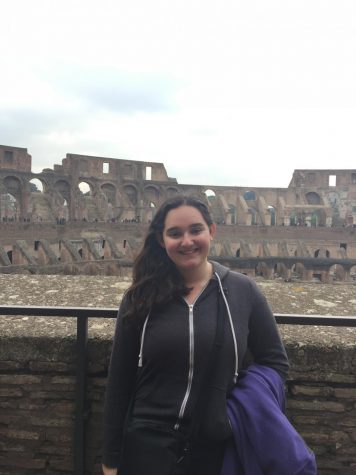District 65 parents discuss ‘How To Be an Antiracist’
February 28, 2020
Since the beginning of this school year, District 65 parents have gathered regularly as part of the Next Steps series to understand how racism impacts the schools and address solutions. This year, the series is grounded in the book How To Be an Antiracist by Ibram X. Kendi.
“Our planning committee got early copies of the book. We read the book over the summer and spent a lot of time planning and thinking about it… People were really looking for action, so we felt like that book was a really important foundation for thinking about how we take action in our community. We felt like it’s important to not just focus on action because there has to be a foundational understanding of concepts around racism. We felt like that book gave us both of those things,” Next Steps co-founder Heather Sweeney said.
There are two main ideas Next Steps is focusing on from How To Be an Antiracist. First, there is no such thing as “non-racist.” Everything is either racist or anti-racist; anything that is not anti-racist is racist. Second, anti-racism work is changing policy.
“I’ve found a lot of the concepts in the book as validating, that it has put a lot of lived experiences and academic experiences that I’ve had into tangible and accessible language and stories, so that has been impactful. I think [with] the idea of success in anti-racist policy, I appreciate that the book has brought that to a community conversation,” Anya Tanyavutti, a member of the Next Steps planning committee and Vice President of the District 65 school board, explained.
Next Steps host three different types of sessions: LEARN sessions, which brings together parents of all District 65 schools to learn and discuss; GROW sessions, regular monthly meetings to deep dive into chapters of Kendi’s book; and ACT sessions, which are specific to individual District 65 schools to create tailored policy solutions.
Next Steps was established last year when Heather Sweeney and Sarah Liddell recognized there were less racially equity discussions occurring at Nichols compared to its elementary feeder schools. Last year they focused on the book Despite the Best Intentions: How Racial Inequality Thrives in Good Schools by Amanda Lewis and John Diamond. Lewis and Diamond are both based in the Chicago area, so they facilitated four out of the six sessions last year.
Originally, Next Steps was intended just for Nichols and its feeder schools. However, the committee recognized a need and an interest to open up the series to parents of all District 65 schools.
“When we were talking about opening up the series across the district, one of our concerns is that while there are many issues the same across the district, there’s also more unique issues in every school. In doing the ACT sessions at different schools, we thought we could tailor it more to the individual schools,” Sweeney said.
For example, since Dewey recently lost two black female teachers, who were replaced by white teachers, Dewey parents are discussing how the racial makeup of the teachers does not reflect the racial makeup of the student body.
Parents from Nichols and Kingsley are looking to create a permanent equity group composed of a diverse group of parents, staff and possibly students to ensure future policies are anti-racist. For Nichols parents, this idea for a permanent equity group stemmed from the fact that all the parents attending the first Nichols ACT session were white.
“We had a lot of ideas, but recognized that we were very limited in our perspective. We thought it just made sense to make this a part of the school culture, a group that was consistently going to do this work because we know there’s so many policies and practices that could be examined,” Sweeney explained.
The Next Steps committee continues to expand their outreach, especially to families who are more greatly impacted by racist policies. At every session there is a spanish language translator present.
“[It is] probably 60-70% white parents, so that’s always something we need to work on… There’s a lot of complicated reasons why people of color are not coming at the same rate that white people are coming. That doesn’t mean that we stop our outreach. Our planning committee is racially diverse, so that’s something that we’re always cognisant of. We run our programming with the lense that our material is meaningful and not just focused on white education,” Sweeney said.
The first LEARN session on Oct. 17 was facilitated by Diamond, a Kellner Family Distinguished Chair in Urban Education and faculty affiliate at the University of Wisconsin-Madison.
Diamond led a presentation on the history of race in America, defining race as “a social construction that emerged to justify slavery, colonialism, settler colonialism, and genocide [which] is deeply intertwined with ideas about intelligence, moral worth, and criminality.”
Next, the implications of race today were discussed. Diamond focused it more on Evanston specifically, including how redlining in Evanston impacted the schools and how suspension rates disproportionately affect students of color in Evanston schools.
Attendants engaged in small and large group discussions about the concepts. Overarching observations included that even policy written in a “neutral” way can have discriminatory outcomes and removing the concept of “non-racism” removes the concept of “non-action.”
The most recent LEARN session on Jan. 28 was facilitated by St. Xavier Professor of Sociology and Nichols’ parent Jacqueline Battalora. The concept of the second session was “Groundwork: Structural Racism and Intersectionality.” Battalora focused particularly on structural racism based upon how whiteness was established through the law.
Parents also discussed how white expectations dictate our schools today. Time was limited, but parents were encouraged to think individually about “What if black girls were our primary concern and focus? How would this change our schools?”
GROW sessions occur the first Tuesday of every month for parents to discuss specific chapters of How To Be an Antiracist. Those sessions have been facilitated by Soola Kim and Melissa Blounc who connect the concepts in the book to Evanston more directly.
LEARN and GROW sessions, along with ACT sessions at Nichols are open for the community to attend. The Next Steps website has a variety of resources for people who want to learn more about racism, intersectionality and anti-racism work.
“I think parent education and parent engagement is vital, so my hope is that we continue to have meaningful and transformative conversations as a community and that Next Steps is funded at a level that allows for it to continue to have an impact and be a resource to our community to not just learn, but to act and create the change that we want to be in the world,” Tanyavutti said.










